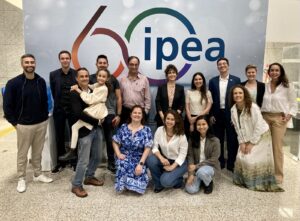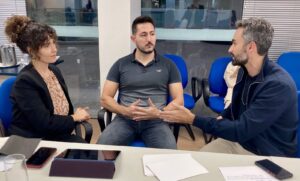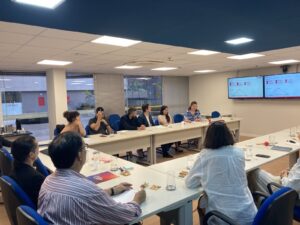With its G20 Presidency in 2024, its upcoming BRICS Presidency and the hosting of the UNFCCC COP30 in 2025, Brazil is taking a leading role in key multilateral processes. These chairmanships present exceptional opportunities to foster international cooperation on issues that challenge countries and societies around the globe.
Among these, climate change and environmental challenges, the uncertain trajectory of the development and use of artificial intelligence (AI), and political polarisation are prominent and closely interlinked.
Against this background, members of the Brazilian MGG network met in Brasília on 7 November to discuss the nexus between climate change, AI and political polarisation, and the opportunities (and limitations) of the ongoing and upcoming multilateral processes chaired by Brazil to address these issue areas.
The event opened with remarks from Dr Daniel Avelino (researcher, Institute for Applied Economic Research – IPEA) and Dr Wulf Reiners (Head of the MGG Programme, IDOS). The discussion was informed by inputs from Alexandra Gurgel Valente da Costa (analyst, Ministry of Environment and Climate Change) and Dr Vinicius Scofiled (coordinator, Ministry of Education). Camila Oliveira (project coordinator and analyst, Ministry of Environment and Climate Change) moderated the discussion. The exchange centred on the increasing and ambivalent role of AI in educational contexts, its severe environmental impacts as well as the effects of political polarisation on multilateral negotiations to mitigate climate change.
Key insights from this meeting were later incorporated into the T20 Side Event co-organised by IDOS/MGG and IPEA on 13 November, during the T20 Summit in Rio de Janeiro. Beyond the substantive exchange, the event also provided an opportunity to reconnect among members of the Brazilian MGG Network and their respective organisations.
- Group discussion © IDOS
- Group discussion © IDOS
- © IDOS
The event was jointly organised by members of the Brazilian MGG network and Vy Dang and Eva Lynders from the MGG team at IDOS. It was kindly hosted at the premises of IPEA in Brasília. It took place in the framework of the PRODIGEES project of the MGG programme with financial support from the European Union, the Federal Ministry for Economic Cooperation and Development (BMZ) and the Ministry of Culture and Science (MKW) of the State of North-Rhine Westphalia.




